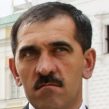
Ingush Leader Paints Positive Picture in Republic Despite Increases in Militant Attacks
Publication: Eurasia Daily Monitor Volume: 10 Issue: 118
By:

The administration of Ingush leader Yunus-Bek Yevkurov is trying to portray the dynamic that is occurring in the republic as positive. As often happens in the North Caucasus, republican leaders tend to claim the achievements of the federal agencies as their own. In this case, the head of Ingushetia is asserting that a four-fold decrease in rebel activity in the republic in 2012 compared to 2010 was the result of the implementation of his program (https://rapsinews.ru/incident_news/20120218/260299831.html). It is difficult to imagine that regional authorities have a say in what the federal government does in their regions. This year, however, Yevkurov claims that militant activity in Ingushetia has decreased further—by seven-fold (www.interfax-russia.ru/South/main.asp?id=401723).
This behavior is beneficial to both Moscow and the regional authorities. Moscow may pretend that the situation is improving through internal development, via dialogue with former rebels, for example. In turn, the Ingush authorities may claim Moscow’s attainments as their own, while at the same time allowing visiting security officials from Moscow to receive state rewards for successful special operations. Moreover, the Kremlin allows regional governors to put the blame on Moscow, if they need to, which is what happened when Yevkurov accused security services personnel from Moscow of being behind the kidnappings and killings of young people in the republic (www.georgiatimes.info/news/72228.html).
This cowardly policy is understandable given the increasing animosity of the general population toward the Russian federal authorities. But it is also having a negative impact on Moscow’s long-term standing in the region as people start to see Moscow as the culprit for all of the region’s problems.
In exchange for such leeway, Moscow demands that the regional authorities take measures against Salafist ideology. The federal authorities regard the Salafist threat as an attempt to steer the population away from the friendly type of “Russian” Islam. This type of Islam enjoys the complete trust of the government and is on the government payroll, which makes it vulnerable to criticism by the forces deemed Salafist. That is why the Ingush authorities elected to hold a religious conference, but unlike in Chechnya and Dagestan, a local one, not an international one (https://kavpolit.com/bogoslovskoe-exo-dagestana-i-chechni/?print). According to the website of Ingush republican radio, a conference of Muslims of Ingushetia expects to issue a decree recommendatory in nature on important matters of interest. The mufti of Ingushetia, Issa-Haji Khamkhoev, will deliver the keynote address (www.ekhokavkaza.com/archive/news/20130619/3235/2759.html?id=25021747). So, it is already clear that there will be no discussion whatsoever at the conference. Yevkurov will also visit the gathering to ask to adopt the decree, and all attendees, starting from the republican mufti and ending with the imam of a remote mountain village, will rally in support of Yevkurov.
An attempt by the Ingush “opposition” to hold a conference in Moscow resulted in the arrest of one of the organizers of the conference, Ilias Tatiev. He was arrested before his departure to Moscow and has been in police custody in the Ingush city of Malgobek ever since (https://izvestia.ru/news/551746). Whenever there is a talk about the opposition in Ingushetia, it should not be seen as an opposition in the usual sense. While the organizers of the opposition conference in Moscow announced there were hundreds of delegates, a majority of attendees were reportedly there only to listen to what the organizers had to say. The demands of the so-called Ingush opposition are about asking Moscow to take some steps to change the situation in the republic, meaning they are only asking Moscow to replace the current leader of the republic. Another telling example of the Ingush opposition’s influence took place when Yevkurov visited Belgium. In the run-up to the visit, all of Ingushetia’s opposition called on the Ingush people to come out for a protest. It almost appeared as if Yevkurov’s visit was about to fail. Yet, Yevkurov’s visit ended in a concert and no one came out to protest against him. The main reason the disgruntled Ingush did not protest was explained this way: “The actors and dancers who came with Yevkurov asked us not to stage protest actions.” This is the face of the Ingush opposition that is still in its early stages of development.
The Ingush authorities are trying to revive the commission for adapting to civilian life those who decided to reject terrorist and extremist activities. According to the authorities, 45 people have surrendered, the most recent being 21-year-old Mussa Polonkoev (www.kavkaz-uzel.ru/articles/225713/). Neither Polonkoev nor the previous 45 alleged militants were known to have any role in the insurgency. They were mostly people alleged to sympathize with the rebels or who were listed as being suspicious for having rejected Sufi Islam. And those who surrender to the authorities are subsequently forced to leave Russia secretly and seek asylum in European countries.
Meanwhile, the number of victims of violence in Ingushetia continues to mount. Two servicemen were injured by a mine on June 18 on the outskirts of a village in Sunzha district. In addition, a counterinsurgency operation regime was introduced in the border area between North Ossetia–Alania and Ingushetia, around the North Ossetian village of Novy (www.kavkaz-uzel.ru/articles/225713/). This incident, the third of its kind in North Ossetia since the start of the year, probably shows that government forces have information about the possible infiltration of militants from Ingushetia into North Ossetia.
Thus, the situation in Ingushetia remains highly uncertain because of multiple factors that render completely irrelevant the authorities’ optimistic reports about the republic. Moreover, with elections for Ingushetia’s governor only three months away, the situation is likely to deteriorate further even though the results of these “elections” are already known and there is no reason to doubt that Yunus-Bek Yevkurov will remain in power.




